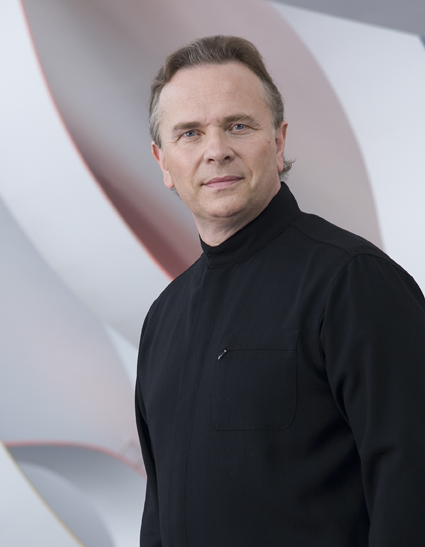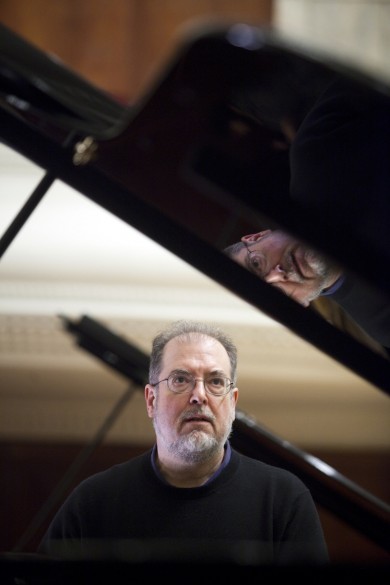CSO returns, with Elder leading evocative Dvořák and boldly projected Sibelius

Sir Mark Elder is one of those rare conductors with an uncommonly wide repertoire in which a dizzying number of composers—including Berlioz, Dvořák, Elgar, and Shostakovich—can be counted as specialties.
The English conductor returned to Orchestra Hall, just 11 weeks after his last local visit, to lead the Chicago Symphony Orchestra on a rare Friday night concert, its first homestand following the recent Asian tour.
Elder appears to be working his way through the set of tone poems Dvořák wrote on decidedly grisly Czech folk tales, with Friday night’s performance of The Water Goblin following The Golden Spinning Wheel heard last fall.
The Water Goblin was the first of the four late tone poems set to Karel Jaromir Erben’s ballads. In this gruesome fable, an earthly woman is abducted and seduced by the violent, over-hydrated title creature. When she doesn’t return after visiting her mother, the goblin kills their child, leaving the decapitated baby’s corpse on the doorstep.
The frolicsome scenario apart, the music is cast in Dvořák’s most melodious vein, worked out with an almost stanza-by-stanza correlation to Erben’s tale, a musical setting of Czech language that Janacek would adopt and expand upon in the tart, angular style of his operas.
In this belated CSO premiere, Elder led a gripping performance, so evocative and clearly textured, one could almost follow the story’s action without a text. Under Elder’s direction, the CSO was on the top of its considerable form, as the deceptively jaunty opening theme turns menacing, with the strings bringing great warmth to the girl’s innocent theme, an ominous expression to the mother’s music and an implacable malevolence to the goblin’s theme. Elder dexterously brought out the subtle nuances of Dvořák’s scoring as with the creepy wind undulations of the goblin and the delicacy of the string writing.
While Dvořák’s tone poem came near the end of his career when the Czech composer’s mastery was at its peak. Sibelius’s Symphony No. 1 is an early work, with the young Finn still in debt to the Russian tradition with big string themes and Late Romantic swagger.
Yet even here Sibelius’s distinctive voice is evident in nascent form, as with the lonely clarinet solo that opens the work, and the jagged brass fragments and skirling winds that seem to reflect something of the austere Northern landscape.
Elder clearly sees Sibelius’s First Symphony more from the Russian tradition it hails from, then the leaner, more taut and concentrated style of the later Sibelius to come. Like Sir John Barbirolli, his predecessor at the Halle Orchestra, Elder takes a big, boldly projected approach, albeit with much brisker tempos than his late Manchester colleague.
At times, one wanted more light and shade as with a too-present opening clarinet solo, a full-throttle brassy vigor and four-on-the-floor style predominating. The middle section of the ripely lyrical Andante had some of the requisite contrast with a mountain spring-like freshness to the nature murmurings.
Fast and driving, the Scherzo went with a big-boned cinematic insistence (did Bernard Herrmann hear this when writing his film score to North by Northwest?). The finale proved undeniably compelling with the expansive main theme emerging with full silver-screen resplendence at its climax, though some fractional hesitations and odd bulges made the performance feel like something of a work in progress.
The evening’s centerpiece was Rachmaninoff’s not unfamiliar Piano Concerto No. 3 with Garrick Ohlsson as soloist. The keyboard warhorse was heard on the same stage just last April, and proved a prime vehicle for Nikolai Lugansky in his CSO debut.

At 64, Ohlsson remains one of our great keyboard artists, with a teeming repertoire as large as his physical frame and fabled technique. Ohlsson has been playing this mighty Steinway-killer for four decades, and the American pianist can still blaze through the fusillade of notes like child’s play, back straight and unruffled. His technique remains estimable and Ohlsson brought a natural eloquence and light poetic expression to this thrice-familiar score. The first-movement cadenza was forceful and pointed and the Intermezzo rendered with a natural eloquence, the scherzando section having a light playful touch.
Yet large sections of this sprawling work emerged rather faceless, technically polished yet wanting in feeling and individuality. Even Elder’s worthy, at times rough-edged, accompaniment failed to lift this Rach 3 out of the routine, while Lugansky’s thrilling rendition still resounds in the memory.
The program will be repeated 8 p.m. Saturday, 3 p.m. Sunday and 7:30 p.m. Tuesday. cso.org; 312-294-3000.
Posted in Uncategorized



Posted Feb 17, 2013 at 10:41 pm by Yuan
Just come back the Sunday performance. Ohlsson’s performance is very disappointing indeed. I thought it would be great experience.
I like Elder’s unusual program of Dvorak and Sibelius, though the woodwind playing of CSO is not entirely satisfying.